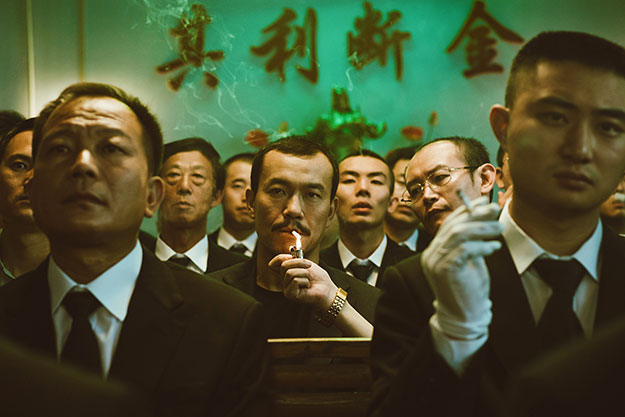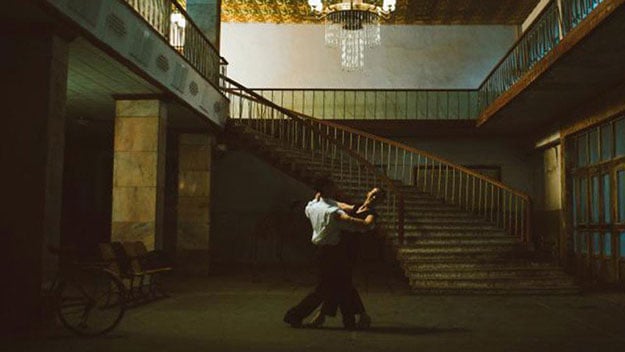Having made his feature debut in 1997 with Xiao Wu, Jia Zhangke is just a little older as a director than the 21st century itself, so it’s fitting that his cinema should be so directly a history of Chinese social change since the start of the millennium. In his last couple of films, he has found novel ways of mapping these changes: in 2013’s A Touch of Sin, he used genre crime narrative and a four-story portmanteau structure to expand his realist palette, while in the ambitious but flawed Mountains May Depart (2015), his episodic narrative about a triangle of love and different social ambitions vaulted several years at a time, finally even leaping into the future (and, rather awkwardly, into the English language and an imagined Australia). By comparison, his new film Ash Is Purest White—premiered earlier this week in competition in Cannes—is a much more conventional affair, in which Jia seems in some ways to be treading water. Its social setting is close to those of the last two films, and the narrative thread is altogether linear: there are significant leaps between the story’s “chapters,” and the film follows one woman—played with magnificent, tantalizing subtlety by the director’s wife and regular star Zhao Tao—over the course of 18 years of her life, from 2001 to the present. The heroine Qiao is, you might say, 21st-century China itself. True, you could also apply that equation to the women in his last two films, but here Jia is more focused than in Mountains on depicting modern Chinese history as a female melodrama. In it, Zhao Tao is Jia’s Joan Crawford, or his Gloria Grahame. Qiao is first seen presiding over a gaming and entertainment hall in the mining-based community near the city of Datong, where she strolls around in a dapper bob, occasionally administering den-mother slaps to the cantankerous but adoring male clientele. Her boyfriend Bin (Liao Fan) is a laconic gangster, an embodiment of muscular cool who’s ready to whip out a gun when the punters get too cranky. He and Qiao are the perfect pair, stylish dispensers of booze, bonhomie, and tough love: the poster couple for the small town world of jianghu that they rule. I’m using jianghu as it appears in the film’s English subtitles (in the French it’s pègre, meaning underworld), the original title Jianghu Er Nv meaning “Sons and Daughters of Jianghu.” What jianghu turns out to signify, so it appears, is not just the milieu and the people who inhabit it, but the code—something like honor or omertá—that they live by, of which miner’s daughter Qiao proves to be the embodiment.
Her belief in this code is put to the test when, following the death of a powerful local boss, another gang decides to take out Bin—which they attempt in a sudden kinetic fight scene of some considerable wuxia improbability, and considerable violence too. This stylized action sequence reaches its peak when Qiao steps out of her and Bin’s car and brandishes a gun at the attackers. It’s her moment of glory and truth—at which point Jia jumps to Qiao in prison. She’s been arrested for possessing a gun, but true to the spirit of jianghu, she refuses to incriminate Bin by admitting that he gave it to her. After a brief sequence showing Qiao doing service at a distant prison—functional padded overalls replacing her snazzy, fancifully hued wardrobe at the start—she’s released after five years inside and heading home in a workaday ensemble of drab beige. Qiao’s attempts to return home—and retrieve and replace the money that’s promptly stolen from her—reveal something of the craft and survival skills she has clearly learned during her five years inside. Wandering into a hotel, she quickly picks out the men likeliest to be nervous adulterers and executes a fabulously astute and audacious scam (it works perfectly on the second try). Zhao Tan’s wit and verve emerge deliciously here. She also, in a wonderful, poignant sequence that seems to have wandered in from nowhere before abruptly dropping out again, has a brief interlude with a charismatic blowhard who gets on her train and holds forth to all and sundry about his business organizing UFO-themed tours. When he admits to Qiao that really he runs a convenience store, it’s the tenderest moment in the film. Back home, Qiao realizes that Bin hasn’t adhered to the jianghu code as she has. In fact, he’s giving her the slip, having paired up instead with a coolly flashy young woman from Hong Kong, who in one English word, “Anyway…”, expresses all the casual contempt she has for Qiao and the old values.
The winds of change are blowing cold for Qiao, and the world she has known is about to disappear under new tides. As in 2006’s Still Life, Jia uses the Three Gorges dam project on the Yangtze River as a marker of both passing time and social change: at one point, the ferry Xiao rides passes a sign pointing out that six years hence, the dam water will have risen past that level. As in other Jia films, changing geography and architecture radically and constantly redraft the landscape: key here in the film’s final part are a half-finished sports stadium and the sleek steel-and-glass palace that is the brand new Datong station. By the time we see it, however, Bin’s circumstances have changed altogether, while Qiao again walks proud in a snazzy, mean-looking black leather overcoat—and back running the same old gambling house, arguing with the same old customers, now more argumentative than ever. The film’s English title is an allusion to the dormant volcano seen in the distance in the opening and closing sequences, and refers to the way that volcanic heat purifies. Xiao emerges from this quasi-alchemical process a purified woman, still adhering to the beliefs of a culture that seems to have sold out; perhaps she’s also purged of both desire and regret. The film’s emotional center is the scene where Bin and Qiao are reunited, after her absence, in a characterless hotel room lit green from outside; his standoffish hesitancy and her calm but devastated acceptance of reality play against each other in a long, sublimely modulated single take. It’s a moment of such intense, painful calm and seriousness that it seems like an age since the film was entertaining us with pistol play, with comically incongruous ballroom dancing, or with liberal usage of Village People’s “YMCA.” But within the film’s 18-year time scheme, eons pass. And still, whatever narratives ellipses Jia throws at her, Zhao Tao’s Qiao endures—through many reversals of fortune and changes of wardrobe. Jonathan Romney is a contributing editor to Film Comment and writes its Film of the Week column. He is a member of the London Film Critics Circle.


